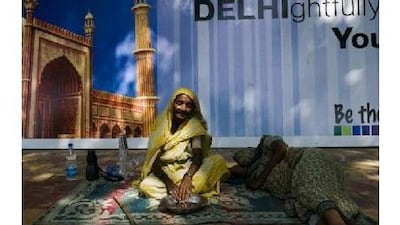At least 130,000 forced from homes In an attempt to present itself as a model of progress, the government is threatening to arrest migrants, slum dwellers and beggars Shaikh Azizur Rahman Foreign Correspondent New Delhi // Tens of thousands of Delhi's poorest residents are paying the price for India's attempt to present the capital as a symbol of progress during the Commonwealth Games, and have either fled the city or are living in shelters, activists say.
"At least 60,000 migrant squatters and slum dwellers and 70,000 homeless beggars have been thrown out of the living places in Delhi because of the Games," said Kalidas Das, a Delhi-based researcher and advocate for beggars' rights. "Two-thirds of these people have gone into hiding inside the city, in safer houses of friends or relatives' elsewhere in the city", or in shelters. "One-third have left for their native states or neighbouring cities," he added.
Raees Ahmed, 38, a rickshaw-puller, was leaving the city on Friday with his wife and three children for Aligarh town, 120km from New Delhi. "Police came to us last night and asked us and a dozen other pavement families to vacate the area. They threatened to arrest us if we stayed on beyond 24 hours," he said. "Government officials and police said that tourists and other big people from foreign countries do not like to see poverty and poor people," Mr Ahmed added.
An unidentified local government official told the Zee News television channel on Wednesday that they were on a drive to "clean up" the city of "unauthorised occupants". "In front of the international visitors we want to present Delhi as a clean city, free from pavement and slum dwellers." But for the thousands already living on the verge of daily crisis, a "clean" New Delhi may have disastrous consequences.
"Living practically hand to mouth, they know they will go hungry when they are not allowed to work and earn money during the period. Many poor migrant families do not even have money to travel to their native states. These people are moving into the shelter homes," Indu Prakash Singh, who works with a New Delhi-based charity, Indo Global Social Service Society, said. To try to ensure that the national capital looks presentable on the world stage, the New Delhi government began its controversial drive to remove beggars and homeless people from the city about a year ago. But after human-rights groups filed a petition in a New Delhi court supporting the rights of the people to live in the city, the court in ordered a halt on the operation in November, calling it a "crime against humanity".
Stung by the court order, the government was forced to shelve the drive. But two weeks ago, New Delhi civic officials, with the help of police, resumed displacing the city's most vulnerable residents, however this time in a "more humanitarian" manner because they were told they could return after the Games, officials told local media. Several teams of police officers and city officials are making daily rounds of areas around the Games venues, asking beggars, migrant vendors, rickshaw-pullers and porters to go home for few weeks or keep off New Delhi's main roads.
"We are requesting the beggars and pavement dwellers to stay away from the streets and main roads for some days, until the foreign visitors leave the city," said Vivek Yadav, a civic official in New Delhi. "Many homeless beggars are going to the [city- and NGO-run] shelter homes in the city. But most of the pavement dwellers are leaving the city. All of them are free to return to their places a few days after the Games are over."
But many of the urban poor who live and work in New Delhi's public spaces complained that the police and civic officials were continuing their "clean-up" drive as aggressively as before. Sheikh Samsuddin, a migrant worker from Bihar, one of India's poorest states, who sells balloons at traffic junctions in New Delhi, said he was told by police last week that if he did not "vanish" he would be sent to jail.
"After police knew that I live in a shack on the pavement nearby, they asked me to take it down for some weeks. I am jobless as well as homeless with my family now," said Mr Samsuddin on Friday as he prepared to board a train for Bihar with his wife and four children. foreign.desk@thenational.ae

